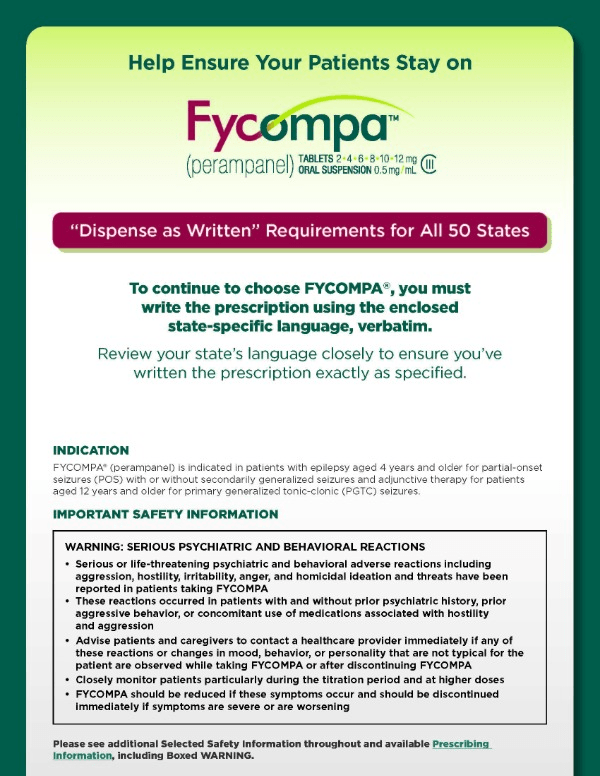We don't always know where a
seizure originates.
As a broad spectrum agent,
FYCOMPA (perampanel) offers potential
seizure control across:1-7
CONVULSIVE
Partial-onset seizures that
secondarily generalize*
Primary generalized
tonic-clonic seizures†
NOT CONVULSIVE
Simple partial seizures*
Complex partial seizures*
*Adjunctive therapy or monotherapy for patients ≥4 years of age.
†Adjunctive therapy for patients ≥12 years of age.
Catalyst is committed to supporting FYCOMPA patients and prescribers throughout 2025 with educational and practice resources, patient programs, advocacy programs, savings cards, and more. Several of these resources are available in the Savings & Support section of this website and on FYCOMPAOnDemand.com.
Start appropriate patients on treatment
with a sample
You can have FYCOMPA (perampanel) samples mailed directly to your office through our portal.* The HCP sample portal helps simplify the process of ordering samples. Just enroll and once your credentials are verified, you can have FYCOMPA samples mailed directly to your office.*
Samples not available in New York, Rhode Island, Kansas, or Kentucky. Samples may be temporarily unavailable in some other states.

Start appropriate patients on treatment with a sample
You can have FYCOMPA (perampanel) samples mailed directly to your office through our portal.*
The HCP sample portal helps simplify the process of ordering samples. Just enroll and once your credentials are verified, you can have FYCOMPA samples mailed directly to your office.
*Samples not available in New York, Rhode Island, Kansas, or Kentucky. Samples may be temporarily unavailable in some other states.
What if your patient misses a dose?
Find out about FYCOMPA's long half-life of 105 hours.

What if your patient misses a dose?
Find out about FYCOMPA's long half-life of 105 hours.
REFERENCES: 1. FYCOMPA US Prescribing Information. Coral Gables, FL: Catalyst Pharmaceuticals, Inc. 2. Schachter SC. Antiseizure drugs: Mechanism of action, pharmacology, and adverse effects. UpToDate. 2020. 3. French JA, Krauss GL, Wechsler RT, et al. Perampanel for tonic-clonic seizures in idiopathic generalized epilepsy: a randomized trial. Neurology. 2015;85(11):950-957. 4. Subbarao BS, Silverman A, Eapen BC. Seizure Medications. 2020 Jul 10. In: StatPearls [Internet]. Treasure Island (FL): StatPearls Publishing; 2021. 5. Federal Register / Vol. 78, No. 204 / Tuesday, October 22, 2013 / Proposed Rules. US Government Printing Office. 6. Doyle A and Alick S. Choosing Antiepileptic Drugs. Practical Neuro. October 2018. 7. Rogawski MA, Hanada T. Preclinical pharmacology of perampanel, a selective non-competitive AMPA receptor antagonist. Acta Neurol Scand Suppl. 2013;(197):19-24.
IMPORTANT SAFETY INFORMATION AND INDICATION
IMPORTANT SAFETY
INFORMATION AND INDICATION
WARNING: SERIOUS PSYCHIATRIC AND BEHAVIORAL REACTIONS
•
Serious or life-threatening psychiatric and behavioral adverse reactions including aggression, hostility, irritability, anger, and homicidal
ideation
and threats have been reported in patients taking FYCOMPA
• These reactions occurred in patients with and without prior psychiatric history, prior aggressive behavior, or concomitant use of medications associated with hostility and aggression
• Advise patients and caregivers to contact a healthcare provider immediately if any of these reactions or changes in mood, behavior, or personality that are not typical for the patient are observed while taking FYCOMPA or after discontinuing FYCOMPA
• Closely monitor patients particularly during the titration period and at higher doses
• FYCOMPA should be reduced if these symptoms occur and should be discontinued immediately if symptoms are severe or are worsening
SERIOUS PSYCHIATRIC AND BEHAVIORAL REACTIONS
In the partial-onset seizures clinical trials, hostility- and aggression-related adverse reactions occurred in 12% and 20% of patients randomized to receive FYCOMPA at doses of 8 mg and 12 mg per day, respectively, compared to 6% of patients in the placebo group. These effects were dose-related and generally appeared within the first 6 weeks of treatment, although new events continued to be observed through more than 37 weeks. These effects in FYCOMPA-treated patients led to dose reduction, interruption, and discontinuation more frequently than placebo-treated patients. Homicidal ideation and/or threat have also been reported postmarketing in patients treated with FYCOMPA. The combination of alcohol and FYCOMPA significantly worsened mood and increased anger. Patients taking FYCOMPA should avoid the use of alcohol. Patients, their caregivers, and families should be informed that FYCOMPA may increase the risk of psychiatric events. Patients should be monitored during treatment and for at least one month after the last dose of FYCOMPA, and especially when taking higher doses and during the initial few weeks of drug therapy (titration period) or at other times of dose increases. Similar serious psychiatric and behavioral events were observed in the primary generalized tonic-clonic (PGTC) seizure clinical trial.
SUICIDAL BEHAVIOR AND IDEATION
Antiepileptic drugs (AEDs), including FYCOMPA, increase the risk of suicidal thoughts or behavior in patients. Anyone considering prescribing FYCOMPA or any other AED must balance the risk of suicidal thoughts or behavior with the risk of untreated illness. Epilepsy and many other illnesses for which AEDs are prescribed are themselves associated with morbidity and mortality and an increased risk of suicidal thoughts and behavior. Patients, their caregivers, and families should be informed of the risk and advised to monitor and immediately report the emergence or worsening of depression, suicidal thoughts or behavior, thoughts about self-harm and/or any unusual changes in mood or behavior. Should suicidal thoughts and behavior emerge during treatment, consider whether the emergence of these symptoms in any given patient may be related to the illness being treated.
DIZZINESS AND GAIT DISTURBANCE
FYCOMPA caused dose-related increases in events related to dizziness and disturbance in gait or coordination. Dizziness and vertigo were reported in 35% and 47% of patients in the partial-onset seizure trials randomized to receive FYCOMPA at doses of 8 mg and 12 mg per day, respectively, compared to 10% of placebo-treated patients. Gait disturbance related events were reported in 12% and 16% of patients in the partial-onset seizure clinical trials randomized to receive FYCOMPA at doses of 8 mg and 12 mg per day, respectively, compared to 2% of placebo-treated patients. These adverse reactions occurred mostly during the titration phase. These adverse reactions were also observed in the PGTC seizure clinical trial.
SOMNOLENCE AND FATIGUE
FYCOMPA caused dose-dependent increases in somnolence and fatigue-related events. Somnolence was reported in 16% and 18% of patients in the partial-onset seizure trials randomized to receive FYCOMPA at doses of 8 mg and 12 mg per day, respectively, compared to 7% of placebo-treated patients. Fatigue-related events were reported in 12% and 15% of patients in the partial-onset seizure trials randomized to receive FYCOMPA at doses of 8 mg and 12 mg per day, respectively, compared to 5% of placebo-treated patients. These adverse reactions occurred mostly during the titration phase. These adverse reactions were also observed in the PGTC seizure clinical trial. Patients should be advised against engaging in hazardous activities requiring mental alertness, such as operating motor vehicles or dangerous machinery, until the effect of FYCOMPA is known. Patients should be carefully observed for signs of central nervous system (CNS) depression when FYCOMPA is used with other drugs with sedative properties because of potential additive effects.
FALLS
Falls were reported in 5% and 10% of patients in the partial-onset seizure clinical trials randomized to receive FYCOMPA at doses of 8 mg and 12 mg per day, respectively, compared to 3% of placebo-treated patients.
DRUG REACTION WITH EOSINOPHILIA AND SYSTEMIC SYMPTOMS (DRESS)
DRESS, also known as multiorgan hypersensitivity, has been reported in patients taking AEDs, including FYCOMPA. DRESS may be fatal or life-threatening. DRESS typically, although not exclusively, presents with fever, rash, lymphadenopathy, and/or facial swelling, in association with other organ system involvement. If signs or symptoms are present, immediately evaluate the patient and discontinue FYCOMPA if an alternative etiology for signs or symptoms cannot be established.
WITHDRAWAL OF AEDs
A gradual withdrawal is generally recommended with AEDs to minimize the potential of increased seizure frequency, but if withdrawal is a response to adverse events, prompt withdrawal can be considered.
MOST COMMON ADVERSE REACTIONS
The most common adverse reactions in patients aged 12 years and older receiving FYCOMPA (≥5% and ≥1% higher than placebo) include dizziness, somnolence, fatigue, irritability, falls, nausea, weight gain, vertigo, ataxia, headache, vomiting, contusion, abdominal pain, and anxiety. Adverse reactions in patients 4 to <12 years were generally similar to patients aged 12 years and older.
DRUG INTERACTIONS
FYCOMPA may decrease the efficacy of contraceptives containing levonorgestrel. Plasma levels of perampanel were decreased when administered with known moderate and strong CYP3A4 inducers, including, carbamazepine, phenytoin, or oxcarbazepine. Multiple dosing of FYCOMPA 12 mg per day enhanced the effects of alcohol on vigilance and alertness, and increased levels of anger, confusion, and depression. These effects may also be seen when FYCOMPA is used in combination with other CNS depressants.
PREGNANCY AND LACTATION
Physicians are advised to recommend that pregnant patients taking FYCOMPA enroll in the North American Antiepileptic Drug (NAAED) Pregnancy Registry. Caution should be exercised when FYCOMPA is administered to pregnant or nursing women as there are no adequate data on the developmental risk associated with use in pregnant women, and no data on the presence of perampanel in human milk, the effects on the breastfed child, or the effects of the drug on milk production.
HEPATIC AND RENAL IMPAIRMENT
Use in patients with severe hepatic or severe renal impairment is not recommended. Dosage adjustments are recommended in patients with mild or moderate hepatic impairment. Use with caution in patients with moderate renal impairment.
DRUG ABUSE AND DEPENDENCE
FYCOMPA is a Schedule III controlled substance and has the potential to be abused and lead to drug dependence and withdrawal symptoms including anxiety, nervousness, irritability, fatigue, asthenia, mood swings, and insomnia.
INDICATION
FYCOMPA® (perampanel) is indicated in patients with epilepsy aged 4 years and older for partial-onset seizures (POS) with or without secondarily generalized seizures and adjunctive therapy for patients aged 12 years and older for primary generalized tonic-clonic (PGTC) seizures.
View the Prescribing Information






